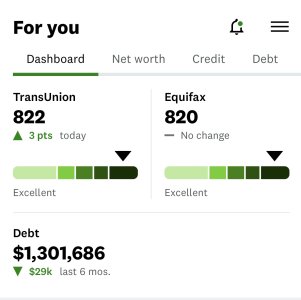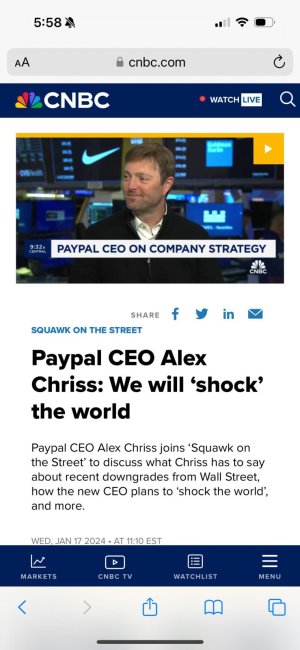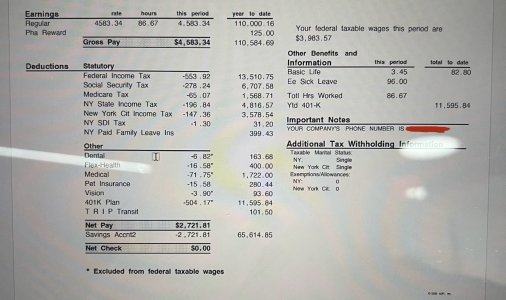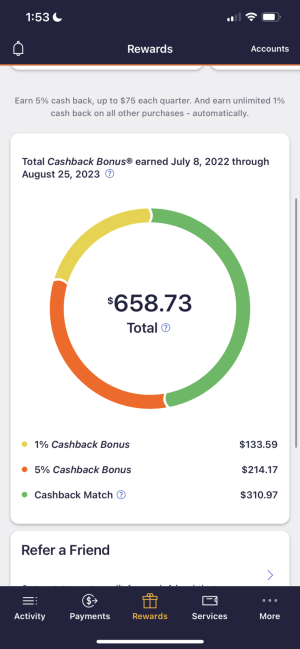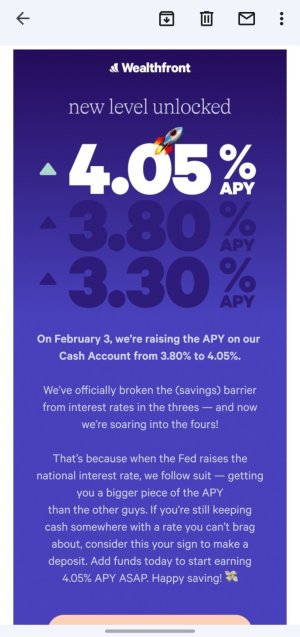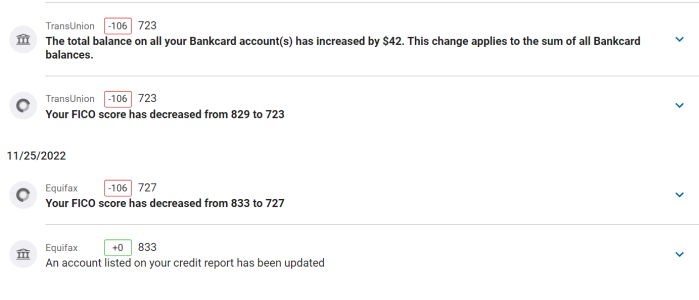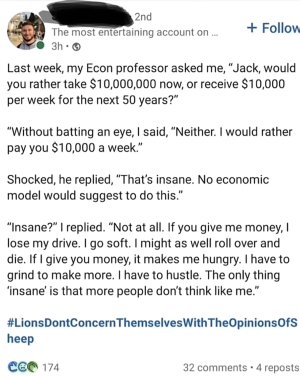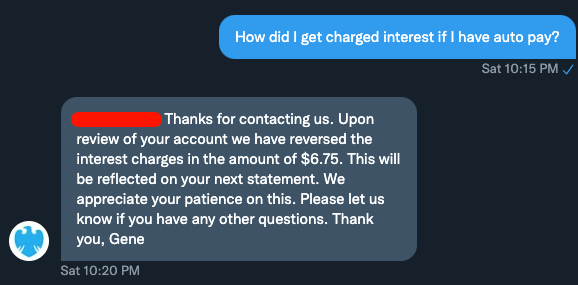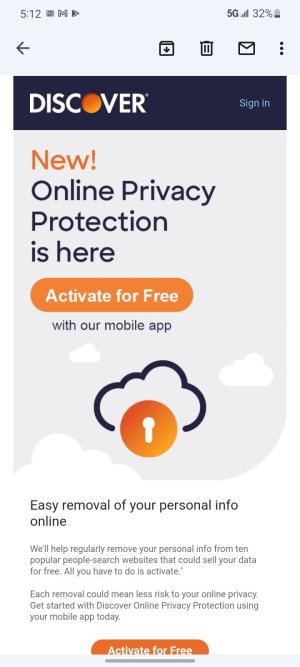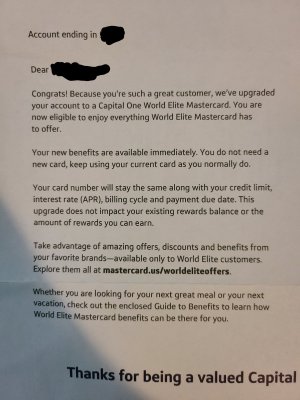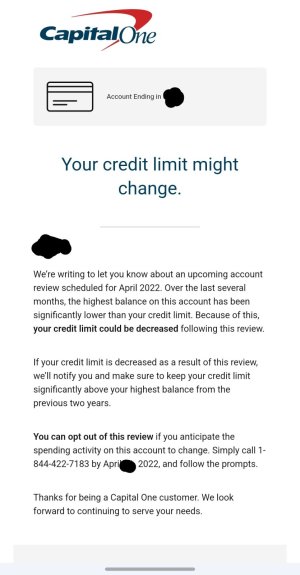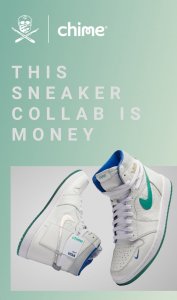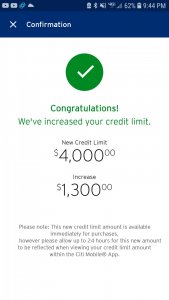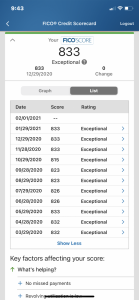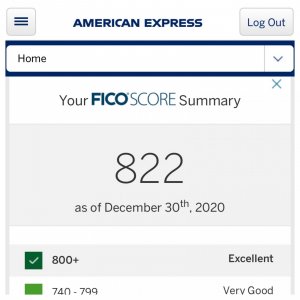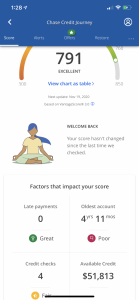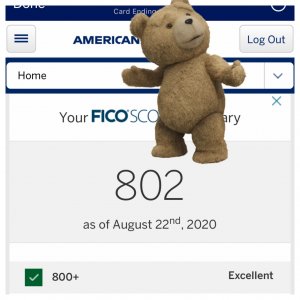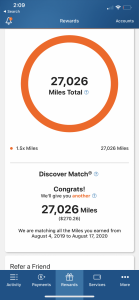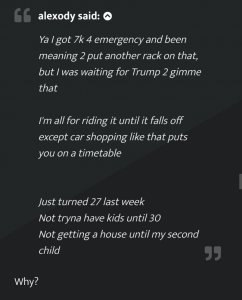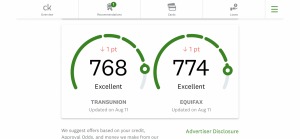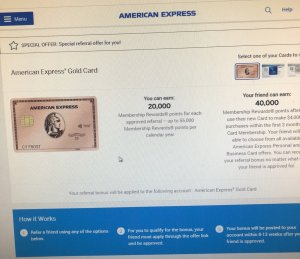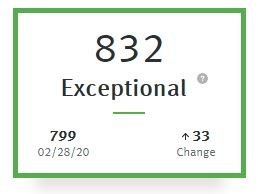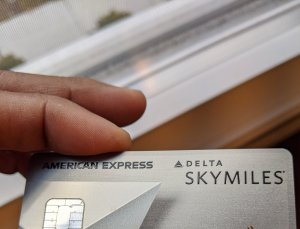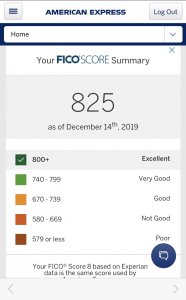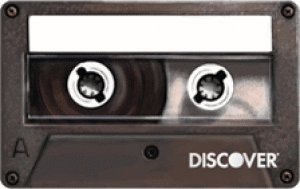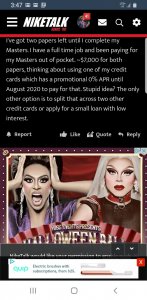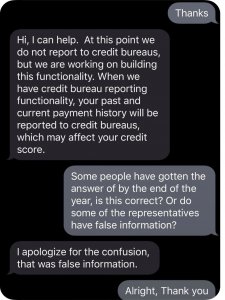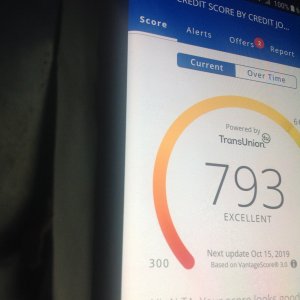Navigation
Install the app
How to install the app on iOS
Follow along with the video below to see how to install our site as a web app on your home screen.

Note: this_feature_currently_requires_accessing_site_using_safari
More options
You are using an out of date browser. It may not display this or other websites correctly.
You should upgrade or use an alternative browser.
You should upgrade or use an alternative browser.
24 Looking to build Credit... What are some good tips on your first Credit Card
- Thread in 'General' Thread starter Started by trynafeelmink,
- Start date
- 93,972
- 33,001
- Joined
- Oct 24, 2010
24 here with no credit card. I will say, ever since I been using "Bill me later". My credit score has gone up substantially.
its basically a virtual credit card
good for you, as long as you pay on time and dont screw around of course its gonna help
- 1,391
- 1,024
- Joined
- May 24, 2013
Pay that card off bruh, being over 50% isn't a good look when you're trying to get another card.At the beginning of the year I was at 540. Made it a point to improve it, now I'm at 650. I'd like to get up to 750 by the end of next year.Does anyone know what the minimum score is required to have a
Amex?
Best Buy?
Target?
well what kind of credit score do you have?
Right now I have a Wells Fargo CC which used to be a secure card. I recently got increased in November. I'll increase again next year but I want another CC just so I can spread the charges. I'm way over 50% right now.
- 15,853
- 3,476
- Joined
- Apr 4, 2006
I thought bill me later didnt report to credit bureaus
- 10,459
- 8,935
- Joined
- Mar 4, 2011
truth about credit
paying off a 1 or 2k credit has about as much affect as a sneeze does on a hurricane.
It's all about your debt to income ratio and how you handle that.
Having accounts open that you consistently keep paying on is what helps.
"We saw how you handled a little bit, so here's more."
People that pay credit off early are not what they are looking for.
They are looking for someone who can consistently pay a lot of interest. Hence a better score.
Paying off stuff quickly is your attempt at circumventing finance charges over time.
They are in business to make money.
Think about where you fit in as a consumer of credit in that scenario.
paying off a 1 or 2k credit has about as much affect as a sneeze does on a hurricane.
It's all about your debt to income ratio and how you handle that.
Having accounts open that you consistently keep paying on is what helps.
"We saw how you handled a little bit, so here's more."
People that pay credit off early are not what they are looking for.
They are looking for someone who can consistently pay a lot of interest. Hence a better score.
Paying off stuff quickly is your attempt at circumventing finance charges over time.
They are in business to make money.
Think about where you fit in as a consumer of credit in that scenario.
- 15,853
- 3,476
- Joined
- Apr 4, 2006
Purposefully paying interest does not help your score. On time payments help your score
- 1,987
- 568
- Joined
- Jul 18, 2008
Exactly. Think about why people want to establish good credit score, it's usually for house loan, auto loan, or business loan. All will require that they carry a balance and pay interest. Institutions will not look at your credit history and think "oh he paid off all his 2k CC balance without paying interest, he's gonna do the same for this 160k house loan." They're gonna see that you always pay on time and therefore you have a low chance of defaulting on the loan, which will earn you a lower interest rate since they are pretty much guaranteed to be paid back in full.Purposefully paying interest does not help your score. On time payments help your score
If people want to purposefully give away money to CC company who already make a fee off of retailer for every purchase, then let them. You're funding the CC company so I can continue to take advantage of their rewards without paying them an interest.
- 1,143
- 105
- Joined
- Nov 26, 2003
pretty good info in here
- 3,949
- 1,197
- Joined
- Nov 16, 2001
This is the part I don't think most people realize. There was this myth for many years that CC companies didn't want people who paid on time because they didn't make any money on them when in reality, they just don't make AS MUCH. Retailers are charged a transaction fee every time you swipe, which is always a percentage higher than you make on your points from the CC company. It's a win for everyone but the consumer because you end up paying ~15% more on your purchases vs. using cash and the CC company makes 3-8% off the swiping fees.Exactly. Think about why people want to establish good credit score, it's usually for house loan, auto loan, or business loan. All will require that they carry a balance and pay interest. Institutions will not look at your credit history and think "oh he paid off all his 2k CC balance without paying interest, he's gonna do the same for this 160k house loan." They're gonna see that you always pay on time and therefore you have a low chance of defaulting on the loan, which will earn you a lower interest rate since they are pretty much guaranteed to be paid back in full.Purposefully paying interest does not help your score. On time payments help your score
If people want to purposefully give away money to CC company who already make a fee off of retailer for every purchase, then let them. You're funding the CC company so I can continue to take advantage of their rewards without paying them an interest.
- 1,728
- 684
- Joined
- Aug 8, 2005
You can carry a balance without paying interest fees. 
quoting myself from page 2.

quoting myself from page 2.
So much conflicting information in here. Here's some tips for you because you don't have a credit card yet.
Find out what your credit score is from https://www.annualcreditreport.com/
First off, if your parents have a credit card, tell them to add you as an authorized user to their account. Why do you want to do this? The age or longevity of their credit history will transfer over to you. Let's say they have 15 year old credit history. You will get this as well. Credit history affects your credit score. The older it is, the higher the credit score.
Getting your first credit card is not easy. You might have to get a secured credit card from a bank (Bank of America for example) or a credit union. This means you have to up money upfront. You have to deposit a thousand dollars. Then you use that for about a year or so and then they will transfer you over to a unsecured (regular) credit card. If you're lucky, you might be able to get an unsecured card based on your credit score, income, debts, and expenses like rent.
For the rest of yall:
Don't wait until your billing statement to end before paying off your credit card.
Your balance at the end of your billing statement is reported to three major credit bureaus by your credit card company. Let's say you have a $3000 credit limit. If you spend $2000 dollars a month on that credit card and wait until after your statement ends to pay your balance, your credit card company will report you as utilizing $2000 of your $3000 credit limit. This is a credit utilization rate of 67%. This will negatively affect your credit score, EVEN if you pay it off in full before the due date. Ideally, you want your credit utilization rate to be 30% or less, and under 10% is even better.
BUT...you still want a balance reporting. So before your billing statement is over, pay off everything EXCEPT 1%-10% of your credit limit. THEN you pay the rest of the balance before the due date so you don't incur any interest charges.
Check out creditboard and myfico forums for more info.
Last edited:
- 1,987
- 568
- Joined
- Jul 18, 2008
To be fair, when people are saying carrying a balance, they're talking about from my billing period to another, which would incur fees. Your way, in the end is still paying in full which is what most of us are saying.
- 5,020
- 7,057
- Joined
- Sep 16, 2010
I just got a Chase "Slate" credit card a few weeks ago. The limit is $800 and I get 0% interest until Feb. 2015. This is my second credit card I got. I got my first credit card through this company called "1st Financial Bank USA" back in March of 2005, but it got closed in 2008 for me spending it like I was a fool (Young and dumb)..smh. I ended up paying it off back in October of 2012. I learned a lot from those times and I'm not playing with credit anymore. I'm trying to get a new car in late 2014, so I think this can possibly get me a very low apr. With this new Chase "Slate" card, I'm mainly going to use it for gas and small purchases that I know I will pay back as soon as it is posted on my account.
I do have a few questions:
1. Have anyone ever got a Chase "Slate" card
2. Does paying the amount in full help your credit score instead of letting it build interest by paying the minimum? ( I plan on paying the amount in full every month)
3. What does it mean when your credit limit increases after 6 months?
I do have a few questions:
1. Have anyone ever got a Chase "Slate" card
2. Does paying the amount in full help your credit score instead of letting it build interest by paying the minimum? ( I plan on paying the amount in full every month)
3. What does it mean when your credit limit increases after 6 months?
Mr.Guy
formerly timidtebow
- 23,944
- 8,608
- Joined
- Jul 3, 2013
I have the Discover it card and the Chase Amazon rewards card. By paying my CCs on time my credit has improved substantially. Chase started me off with a $500 limit and they recently increased it to $800.
- 1,608
- 260
- Joined
- Aug 19, 2012
I think
i wanna get chase sapphire so i can get my credit score popppinChase Sapphire
&
Chase Hyatt
are paying for my honeymoon!
Mr.Guy
formerly timidtebow
- 23,944
- 8,608
- Joined
- Jul 3, 2013
Just got approved for a bank of America Visa rewards card.
- 15,853
- 3,476
- Joined
- Apr 4, 2006
I just got a Chase "Slate" credit card a few weeks ago. The limit is $800 and I get 0% interest until Feb. 2015. This is my second credit card I got. I got my first credit card through this company called "1st Financial Bank USA" back in March of 2005, but it got closed in 2008 for me spending it like I was a fool (Young and dumb)..smh. I ended up paying it off back in October of 2012. I learned a lot from those times and I'm not playing with credit anymore. I'm trying to get a new car in late 2014, so I think this can possibly get me a very low apr. With this new Chase "Slate" card, I'm mainly going to use it for gas and small purchases that I know I will pay back as soon as it is posted on my account.
I do have a few questions:
1. Have anyone ever got a Chase "Slate" card
2. Does paying the amount in full help your credit score instead of letting it build interest by paying the minimum? ( I plan on paying the amount in full every month)
3. What does it mean when your credit limit increases after 6 months?
3) It means you have more credit available to you on that card
- 31,469
- 1,915
- Joined
- Sep 16, 2003
It's actually not wise to use a certain amount and pay it off in full every month to build credit. The CC companies don't make any money off of you.
1) have a small amount of open accounts (line of credit , CC etc...). Quality>Quantity , you rather have 2 CCs with 30k total available credit than 15 CCs with 30k total available credit.
2) keep your debt to credit ratio low (probably around 20%, Don't pay everything off in full. You want to pay interest so that the CC company can see that you are responsible and can handle debt )
3) Never skip a payment or make a late payment( they usually give you a grace period so don't surpass that)
4) ask for when you're eligible for a credit increase and how you will be able to qualify, ask for the credit increase rather than getting a new CC.
5) Spend responsibly and never go close to your limit, remember to keep it at 20% or lower.
6) Be patient and don't make too many credit inquiries. Everytime they run your credit, it lowers your score by a little.
This whole system is so crooked
 Ah well.
Ah well.- 3,949
- 1,197
- Joined
- Nov 16, 2001
2. The only difference in your score would be not paying your balance in full and using too much of your available credit. If it's too high, it'll actually lower your score. Just pay the balance in full if you're going to use a credit card so you're not paying any more than you need to to the bank for a good score.I do have a few questions:
1. Have anyone ever got a Chase "Slate" card
2. Does paying the amount in full help your credit score instead of letting it build interest by paying the minimum? ( I plan on paying the amount in full every month)
3. What does it mean when your credit limit increases after 6 months?
3. You have more of the bank's money available at your disposal to use.
- 5,020
- 7,057
- Joined
- Sep 16, 2010
SO, paying it in full every month is the best way to raise your credit score?2. The only difference in your score would be not paying your balance in full and using too much of your available credit. If it's too high, it'll actually lower your score. Just pay the balance in full if you're going to use a credit card so you're not paying any more than you need to to the bank for a good score.
3. You have more of the bank's money available at your disposal to use.
- 5,897
- 1,189
- Joined
- Jul 21, 2011
I'm 19 and have a 750+ credit score
I don't have any idea.
Just got my first credit card today actually. Discovery card.
I don't have any idea.
Just got my first credit card today actually. Discovery card.
- 93,972
- 33,001
- Joined
- Oct 24, 2010
I'm 19 and have a 750+ credit score
I don't have any idea.
Just got my first credit card today actually. Discovery card.
what credit limit did they give you?

- 24,015
- 3,122
- Joined
- Jul 2, 2001
Lots of knowledge and contradicting info in here, just like all over the Internet. 

- 24,015
- 3,122
- Joined
- Jul 2, 2001
Didn't know they had a forum for that 

- 15,853
- 3,476
- Joined
- Apr 4, 2006
Didn't know they had a forum for that
I lurk on there frequently
- 9,516
- 3,730
- Joined
- Nov 24, 2009
Didn't know they had a forum for that
I lurk on there frequently
Because of that forum my credit went up 100 points since this past Feb.
I was really poor 

Similar threads
- Replies
- 59
- Views
- 6K
